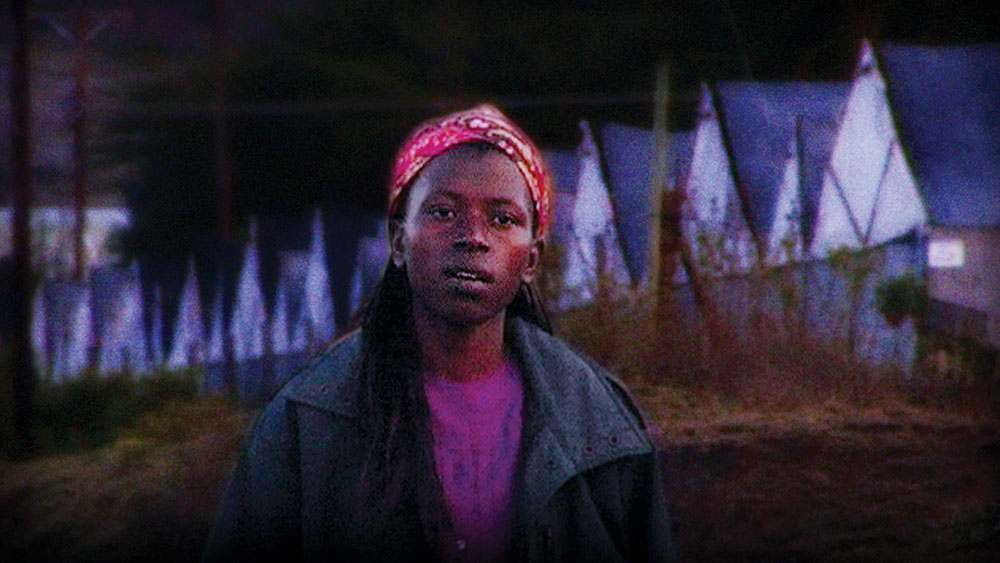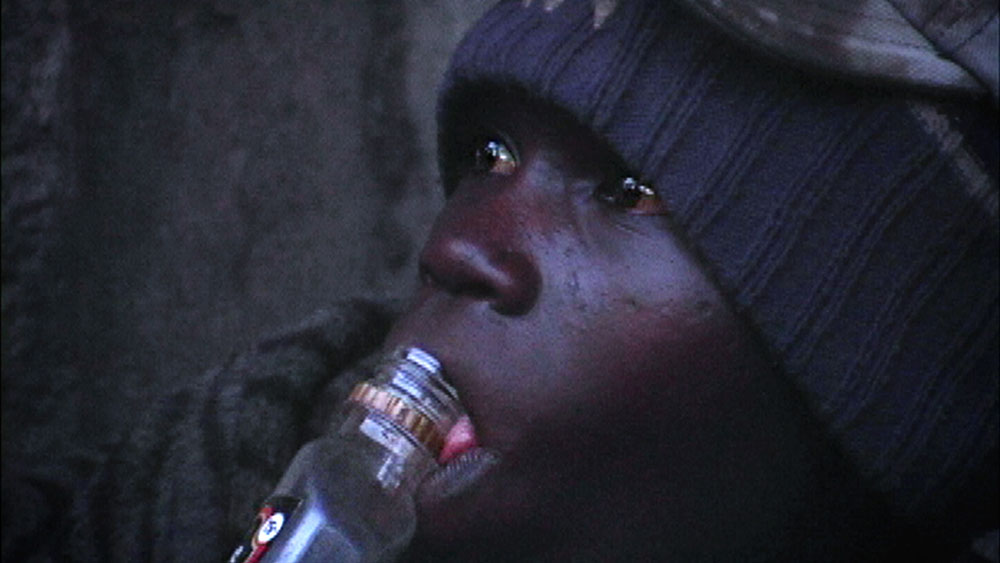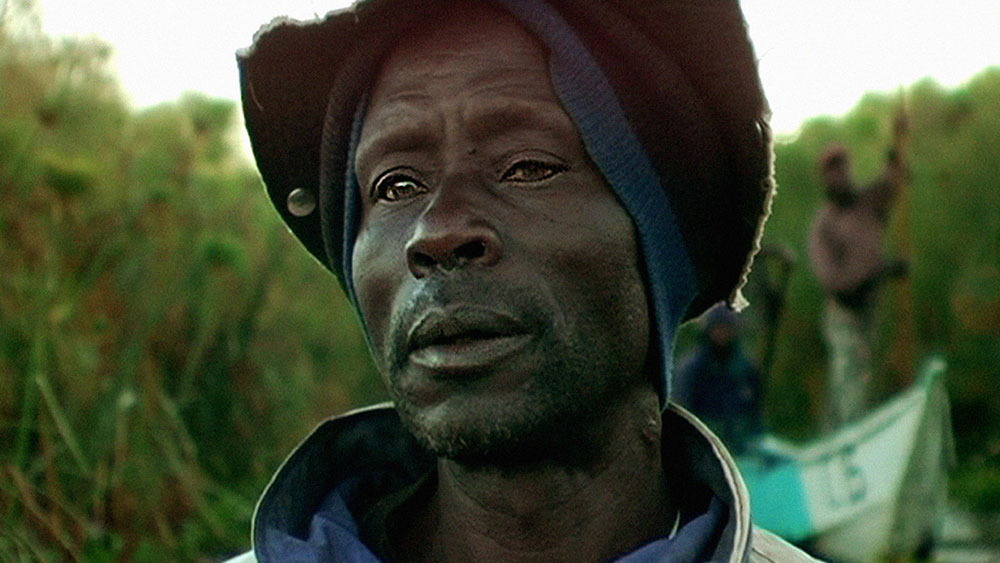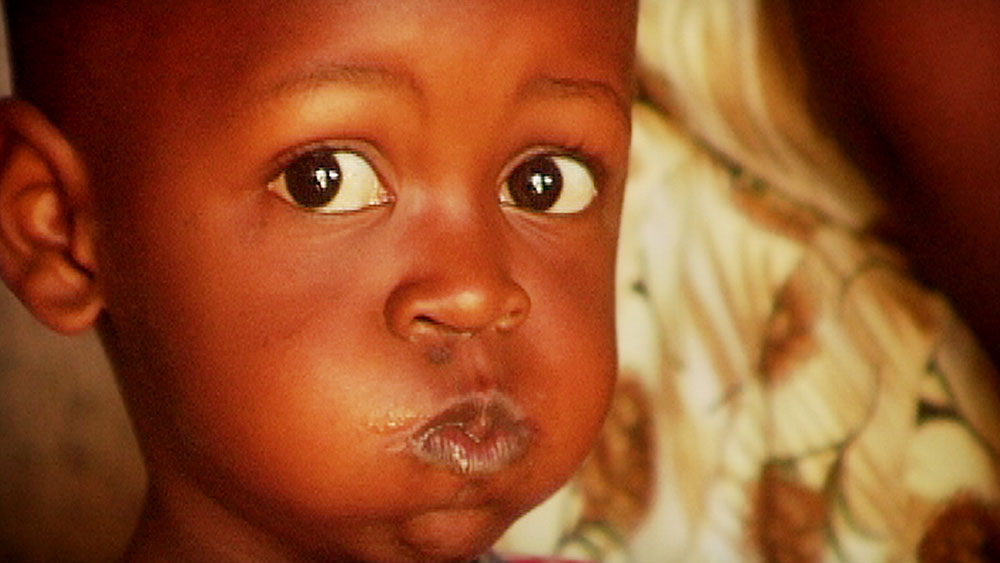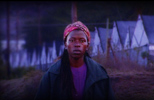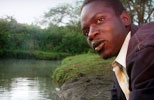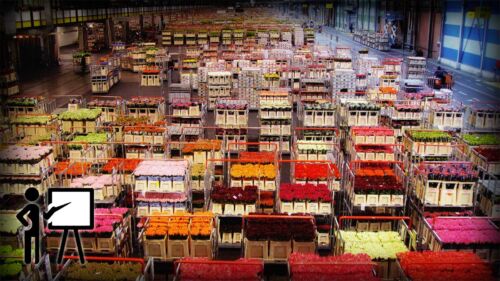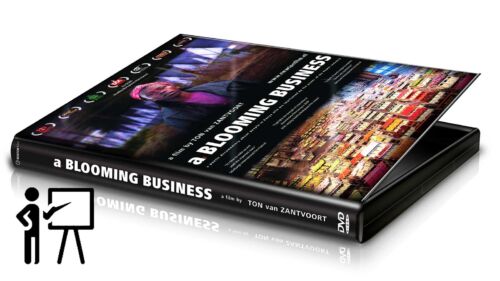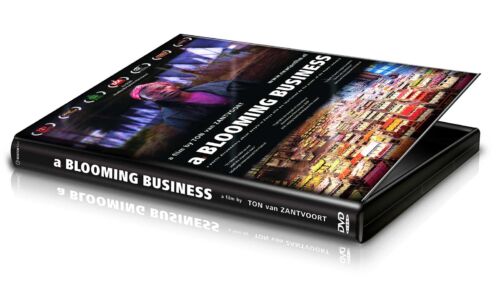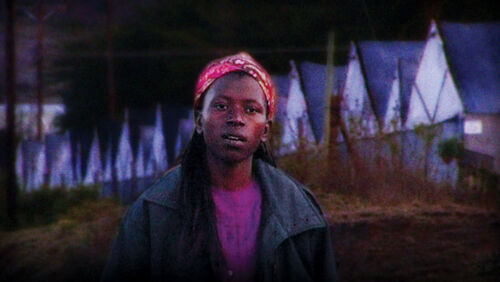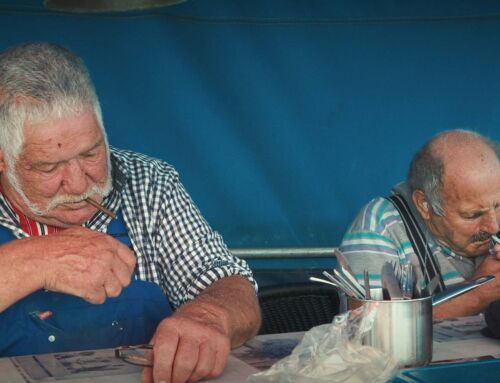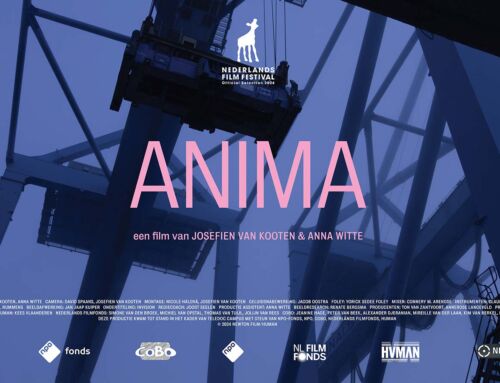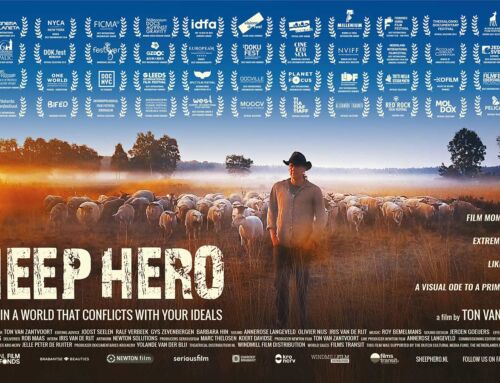It’s time to wake up and smell the imported roses.
a BLOOMING BUSINESS is an multiple award winning documentary about people who are imprisoned by the flower industry. In an intriguing way a BLOOMING BUSINESS shows the world of Jane, Oscar and Kennedy, who all depend some how on the huge flower farms in Naivasha, Kenya. A poetic, cinematic and poignant documentary in which director Ton van Zantvoort goes deep into the lives of the main characters. Is the smell of the imported rose so sweet indeed?
a BLOOMING BUSINESS is broadcasted worldwide, screened and awarded on more than 100 international film and documentary festivals.
a BLOOMING BUSINESS – documentary trailer
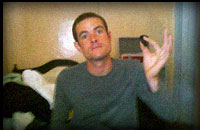
Colleague & friend Stijn in Naivasha
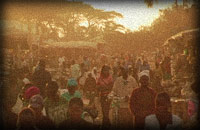
Karagita: the home of employees
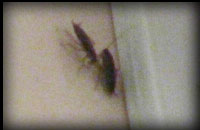
Companions in the night
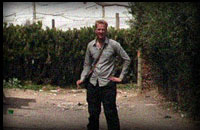
The photo camera was destroyed. This is the only still of me in Naivasha.
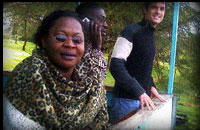
Colleagues on the spot
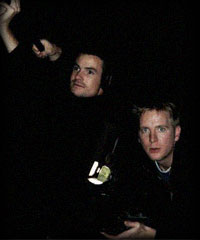
Filming at night
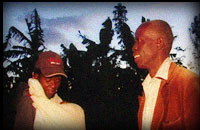
After a year Jane could visit father
a BLOOMING BUSINESS behind the scenes
From the director
Extensive preparations went by before we went to Kenya to shoot “a BLOOMING BUSINESS.” Together with Eunice Muthoni (Kenyan Human Rights Watch) we travelled to Naivasha, one of the many areas that has grown significantly because of flower growing this past decade.
It was obvious that for many Kenyan people the rose meant something completely different than for most Dutch people. As Jane would say later on: “The rose means for me hard work, having thorns in my hands, with a lot of chemicals.” Jane, as many other workers, also had no clue what western people use these flowers for. She thought the roses are used for toilet refreshers. When I explained that, in western countries, many lovers buy each other flowers on, for example, Valentine’s day, she reacted surprised. “In Kenya the women prefer money on Valentine’s day”.
Getting accepted into the workers’ class and earning trust of many workers was a thing on its own. People do not dare to speak up, as the white Mzungu’s stand on the other side (the employers side). We met the head of the workers union. For a long time he was a flower farm employee as well and is now a well respected person among the workers. He knows many of them and their stories personally. We planned meetings at secret places where workers could tell their stories and experiences in confidence. We had interviews in groups and one on one, during which we heard stories of more than 30 female employees from different farms. Some farms were better than others, but the stories were even worse than I could have imagined. I was shocked and got emotional: I felt more urged to make this film and promised myself I had to continue this project, no matter what. Later on in the process, whenever I felt down or was wondering why the hell on earth I was doing this (as nobody asked me to) I remembered that moment, these people and my obligation to them to finish this film.
Most issues that the people had to deal with, were not visible to the camera: corruption, sexual abuse, oppression and very bad working conditions. This was not easy, if not impossible, to film. It sure was a big challenge. Several employees told us that the companies are using many ways to avoid international rules. Women had to work while the men were spraying dangerous chemicals in the same area. Women were not allowed to wear protective gloves as they would damage the roses. As if that was not harmful enough, people had to work overtime without getting paid for it. I ran into all kinds of cunning diversions like these, fabricated by the employers. Eunice said: “Even our minister of Labour owns a flower farm, so if he improves the labour laws, he will also be affected.”
There are good aspects to the farms as well: they provide many jobs, have their own hospitals and even provide houses for the employees. But here lies a cunning diversion yet again. Eunice said (and many (former) employees confirmed) that farm hospitals are the perfect way to cover up the chemically affected people. When results from testing for chemicals turns out positive, these people get fired immediately. So in all Naivasha there are very little reported cases of sick people due to spraying chemicals or any of that kind. The contradicting fact is that we met quite a lot of these (unknown) cases.
The farms provide many jobs, which causes an oligopoly more or less. Eunice said: “There is a high rate of unemployment in this country. The growers take advantage of this. One sacked leads to more at the gate looking for a job. Even the houses, which are provided by the employers, are part of silencing employees. Female workers who are sexually harassed, will not easily, often not at all, report their cases, because they will not only lose their jobs, but also their houses, medical care and even schooling as well.” Too much is at stake if one would want to speak up about their problems at work. Many workers felt oppressed by their managers or supervisors. My naïve belief that the fair-trade flower would clear this all, appeared not to be completely true. From all the companies in Naivasha, only few have a fair trademark. Where do all the flowers that do not have trademarks go? Several employees confessed that there is a lot of outsourcing of very badly grown flowers to the few companies that have a trademark. That is how the farms without a trademark are still able to sell their flowers all over the globe. It was clear we were in the middle of a dark, mysterious and hazardous situation. I felt the anxiety every day I was there (and even after I returned home I have sleepless nights). Standing face-to-face with corruption is almost inevitable; it reaches into the highest position of society all the way down to the lower class. Therefore, there were only few people that we could trust. We tried to attract as little attention as possible, but Naivasha is not a real big place nor is it visited by a lot of tourists. Two white Mzungu’s with a camera and a boom microphone in a slum area like Karagita (where many workers try to obtain a house) attract quite some attention. To avoid getting noticed as much as possible, we often had to meet our characters outside of the farming and living areas. The actual filming was prepared well, which we tried to do as unobtrusively as possible.
Three months after we left, I received news from Eunice. Apparently, we were not careful enough after all; one of Jane’s (farm worker) friends had sold her out. This was a female farm worker as well, who was even suggested as guide by the workers union. She wanted to have money from Jane, which Jane did not receive from us. As a result, Jane got fired by the company. Eunice said that according to her resign letter, she “had shared confidential company information with strangers.” With help of my brother we send money for Jane to get independent. Now, almost one and a half year later, I still did not see that resign letter and do not know for sure she even got fired, let alone for what reason she would be fired.
Not everybody was afraid to speak up though. Many people were already fired by the blooming companies and really felt relieved that there was someone they could share their story with. We met Oscar, Kennedy and many other people who used to work at these farms. Even though these people were fired some time ago, they were still experiencing negative consequences from the farms. The water level of lake Naivasha has dropped enormously -as they say- to the mass water obstruction by the farms. A rose gets one and a half liter a day, according to the irrigating manager of the company that we filmed. (After the film was finished I was told by the farm owner he should have said per m2.) > Millions of roses grow in Naivasha. Fishermen also say that the breeding zones of the fish, is completely damaged because of this obstruction and also many fish die, because the chemicals that are used during spraying, in a lot of cases directly floods into the lake after it rains. Fisherman Kennedy catches less and less fish every year. When we were there he would only catch three fish a day, which he needed to share with his other two colleagues. He has a family of 5 to take care of.
Oscar the water supplier also told us he experiences the damaging consequences daily. He makes a living of selling the chemically affected water to the society (mostly farm employees.) Furthermore, there are very few places where people can get access to the lake. The whole lake side is now surrounded by farms (and some hotels). For common people it is almost impossible to get access to the lake. Getting to know Oscar made also clear how complex the situation is in Naivasha (and probably a big part of Africa): he is a sincere, polite businessman, who did good on school, but unfortunately his father did not have the right connections for him to get the right job. He doesn’t have a choice than sell the polluted water to the community. Also people like our sincere taxi driver Peter, explained how frustrated he got by this and how impossible it is to achieve something in the world where corruption is dominating.
Stijn and I spent many hours discussing and writing at our hotel to figure out how to tell this so enormous complex story. In the beginning, we would talk about it in the hotel’s restaurant, but that appeared to be the main gathering place for flower farm managers and supervisors. Eventually, we spent nights writing and discussing on our balcony.
There are many more stories to tell, which I can not all tell. I started a BLOOMING BUSINESS as an artist and with a human interest point of view. Now a BLOOMING BUSINESS is finished I don’t know what will happen next. It is the first time I got into a situation like this, and to be honest I don’t think I want to get in something similar again. I am a film maker, not a journalist. I made a personal portrait about Naivasha and the people that I have met: their lives, their believes, their struggles, and their hopes and dreams. a BLOOMING BUSINESS shows the complexity of existence of human kind in our new globalizing world. Let this film be the voice for those that do not have a voice. Let this film be a reason for institutions to investigate the fair trademarks. Because if I buy fair trade flowers, I expect them to be fairly grown.
a BLOOMING BUSINESS
produced & directed by
TON VAN ZANTVOORT
scenario, cinematography, sound & editing by
TON VAN ZANTVOORT
first assistant & sound by
STIJN VAN EEKELEN
music composed by
ROY BEMELMANS
poster-, dvd- & web design and realization by
TON VAN ZANTVOORT
commissioning editor VPRO
BARBARA TRUYEN
with
JANE and children
REAGAN, DAVIS, BRIAN & SHARON
OSCAR
water supplier
KENNEDY
fisherman
PETER
employee – filmmaker
AGNES
former employee
GEOFREY
former employee
EUNICE
Human Rights Watch
support & advise
WOUTER VERHOEVEN
ANNEROSE LANGEVELD
STIJN VAN EEKELEN
GIEL VAN SCHAIJK
MARCEL MELCHERS
JEROEN KOOPMANS
JEROEN BERKVENS
STEFAN KAMP
MENNO BOEREMA
TOINE DE JONG
KURT COOYMANS
Thanks to
PETER OTIENO OMBUDE
EDWARD INDIMULI
MOHAMED MUKONGO
JUDITH, MOUNIE, WANGERA
THE FLOWERFARM & AUCTION
RIPERIAN ASSOCIATION
PHANUEL DIANGA- SHER LAB
PETER EDWIN OCHARI
KIMANI KIGURU
NATHALIE VAN HAREN
VINCENT OUDENDIJK
FRANK VAN MOURIK
MAUREEN FREICHMANN
BIANCA LOOMAN
FAM VAN ZANTVOORT
FAM LANGEVELD
AND EVERYBODY THAT MADE THIS FILM POSSIBLE
a BLOOMING BUSINESS is not an indictment to the industry or people in this film.
Copyrights 2009 NEWTON film/ Ton van Zantvoort
ISAN 0000-0003-DFF2-0000-8-0000-0000-D
a BLOOMING BUSINESS festival screenings
For more screenings visit the website
Mujeres del Mundo, Madrid, Spain, March 2012,
Clovek v tísni, People in Need, Praha, Czech Republic, 2012
Cégep André-Laurendeau LaSalle Montréal, Canada, 2012
International Film Festival for Human Rights, different towns in Basque country, France, February 2012
Kinookus FFF, Dubrovnik, Croatia, September 2011
NMIT (Northern Melbourne Institute of TAFE), Preston, Australia, September 2011
Slow Food International, Bra, Italy, 2011
Tutti nello stesso piatto, trento, Italy 2011
Sunchild Film Festival, Armenia, October 2011,
This Human World, Austria, December 2010
Art of the Document, Multumedia Festival, Poland, November 2010
XV International TV Festival Bar Montenegro, 2010
Jihlava IDFF, Czech Republic, October 2010
Duke City DocFest, Albuquerque New Mexico, October 2010
International TV Festival Bar, 15th festival, Montenegro, October 2010
Etnia FIlm Festival, Finland, October 2010
Ad Hoc Inconvenient Films, LHCR, Lihuania, October 2010
Criterio Ambiental, Costa Rica, September 2010
Split New film festival Poland, September 2010
Centraal Museum – Recht voor zijn Raap / In your face, June – September 2010
Bolivia el septimojo es tuyo, Bolivia, June 2010
Documentarist Film Festival, Istanbul, Turkey, June 2010
Millenium Film Festival – Belgium June 2010
FICA – Festival International de cinema e video ambiental – Brasil, June 2010
Planete Doc Review – Against Gravity, Poland, May 2010
Cinema Politica, Toronto, May 2010
KPFK Los Angelos Film Festival, Santa Barbara, April 2010
Montreal Human Rights Film Festival, Canada, March 2010
Cinema Planeta Mexico, Mexico, March 2010
Human Rights Human Wrongs, Norway, february 2010
DOCPoint Helsinki Documentary Festival, Finland, January 2010
International Documentary Festival Agadir, Morocco, December 2009
Med Film Festival, Italy, November 2009
ânûû-rû âboro, Peoples’ film festival, New Caledonia, November 2009
AFF, Astra Film Festival, Romania, November 2009
DOK Leipzig, Germany, October 2009
MEDI MED Docs come true, Spain, October 2009 /
Planet in Focus, Environmental Film Festival, Canada, September 2009
NFF, Dutch Film Festival, The Netherlands, September 2009
VIFF, Vancouver International Film Festival / October 2009
NIFF, Newport International Film Festival/ USA/ June 2009
EIFF, Edinburgh International Film Festival/ UK/ June 2009
Cinema City 09/ Serbia/ June 2009
Filmfoyer, TAC, Groene Engel, Verkade fabriek / The Netherlands/ June 2009
Rodos International Films+ Visual Arts Festival/ Greece/ June 2009
New Zealand International Film Festival/ New Zealand/ July 2009
GFFIS, Green Film Festival in Seoul Korea May 2009/
BKKC, Film in Brabant /Eindhoven, Grave, Denbosch, Breda, Tilburg, Oss/ The Netherlands/ 2009/
IFFB, International Film Festival Breda/ The Netherlands/ 2009/
TDF, Thessaloniki Documentary Festival/ Greece/ 2009/
a BLOOMING BUSINESS press kit
 |
||||||||||||||||||||||||||||||||||||||||||||||||||||||||||||||||||||||||||||||||
|
Film information 3 Film screenings 4 Synopsis 5 Credits 6 About the director & directors statement 7 Resume director Ton van Zantvoort 8 Publications 9 Film stills 10 Directors stills 12 |
||||||||||||||||||||||||||||||||||||||||||||||||||||||||||||||||||||||||||||||||
 |
||||||||||||||||||||||||||||||||||||||||||||||||||||||||||||||||||||||||||||||||
| Film details Original title: a BLOOMING BUSINESS Original language: English/ Swahili Subtitled language: 22 European Union languages Homepage: www.newtonfilm.nl/blooming_business/ Running time: 52 minutes Date of completion: March 2009 Date/ place of first screening: March 13, 2009/ Thessaloniki, Greece Country of Filming: Kenya, The Netherlands Country of Origin: The NetherlandsPeople Production company: NEWTON film Producer/ director: Ton van Zantvoort Country: The Netherlands E-mail: info [at] newtonfilm.nl Filmography: GRITO de PIEDRA/ 59 min/ 2006 First/ second film: yes Co-production: VPRO/ Barbara Truyen World distribution: NEWTON film Sales contact: US/ Canada: 7th Art Releasing Sales contact: World: Journeyman PicturesTechnical information Preview copy: 52 minutes, DVD PAL/ NTSC, online screening possible Exhibition format: 1. Digibeta PAL, 16:9 (anamorphic), 1.66, English sub, color, 52 min, Dolby Digital stereo 2. HD cam NTSC, English subtitles, English Subtitles 3. DV cam French subtitles 4. DVD with 22 European Union Languages Categories: Human interest /-rights, social/ environment issues, globalizationAwards– Jury Award, FIFDH, Festival International du film des droits de l’homme de Paris, 2011 – Audience award, The Art of the Document, 2010 – Special jury mention 2010 – Golden olive award for best documentary, International Festival, Montenegro 2010 – Audience Award, Millenium International Documentary Festival, Belgium 2010 – Award for best film chosen by media professionals, Festival Internacional de Cinema Ambiental FICA, Brasil 2010 – Best photography Award, XV International TV Festival Bar, Montenegro,2010 – Jury Award best treatment, Cinema Planeta, Mexico 2010 – Audience favourites Mixed Greens, Planet in Focus, Canada 2009 – Open Eyes Award special mention, Medfilm Festival, Italy 2009, – Dok Leipzig Healthy Workplaces Film Award, International Leipzig Festival, Germany 2009 |
||||||||||||||||||||||||||||||||||||||||||||||||||||||||||||||||||||||||||||||||
 |
||||||||||||||||||||||||||||||||||||||||||||||||||||||||||||||||||||||||||||||||
| Selection of International Film Festivals TDF competition, Thessaloniki Documentary Festival,Greece, 13 March 2009 IFFB competition, International Film Festival Breda, The Netherlands, 27 March 2009 Plaza Futura, The Netherlands, May 2009 Film Café Grave, The Netherlands, May 2009 Verkade Fabriek, The Netherlands, May 2009 Green Film Festival in Seoul, Korea, May 2009 Electron, The Netherlands, May 2009 Cinema City 09, Serbia, June 2009 TAC, The Netherlands, June 2009 Filmfoyer, The Netherlands, June 2009 Rodos International Films+ Visual Arts Festival, Greece, June 2009 NZIFF competition, New Zealand International Film Festival, New Zealand, July 2009 Groene Engel, The Netherlands, July 2009 VIFF competition, Vancouver International Film Festival National Cinemateque, Denmark, September 2009 NFF, Dutch Film Festival, The Netherlands, September 2009 MEDI MED Docs come true, Spain, October 2009 Planet in Focus, Environmental Film Festival, Canada 2009 DOK Leipzig, Germany, October 2009 AFF competition, 10th Astra Film Festival, Romania, 2009 ânûû-rû âboro, Peoples’ film festival, New Caledonia, November 2009 Med Film Festival competition, Italy, November 2009 International Documentary Festival Agadir competition, Morocco, December 2009 DOCPoint Helsinki Documentary Festival competition, Finland, January 2010 Human Rights Human Wrongs, Norway, february 2010 Cinema Planeta Mexico, Mexico, March 2010 Montreal Human Rights Film Festival, Canada, March 2010 Cronograf Documentary Film Festival, Moldova, May 2010 Planete Doc Review – Against Gravity 2 competitions, Poland, May, 2010 FICA – Festival International de cinema e video ambiental – Brasil, June 2010 Centraal Museum Utrecht – In your face, june – September 2010 Bolivia el septimojo es tuyo, Bolivia, June 2010 Documentarist Film Festival, Istanbul, Turkey, June 2010 Millenium Film Festival – Belgium, June 2010 Criterio Ambiental, Costa Rica, September 2010 Split New film festival Poland, September 2010 Centraal Museum – Recht voor zijn Raap / In your face, June – September 2010 Jihlava IDFF, Czech Republic, October 2010 Duke City DocFest, Albuquerque New Mexico, October 2010 International TV Festival Bar, 15th festival, Montenegro, October 2010 Etnia FIlm Festival, Finland, October 2010 Ad Hoc Inconvenient Films, LHCR, Lihuania, October 2010 This Human World, Austria, October 2010 Art of the Document, Multumedia Festival, Poland, November 2010More screenings coming soon… |
||||||||||||||||||||||||||||||||||||||||||||||||||||||||||||||||||||||||||||||||
 |
||||||||||||||||||||||||||||||||||||||||||||||||||||||||||||||||||||||||||||||||
| Synopsis 100 wordsa BLOOMING BUSINESS is a poetic documentary by TON van ZANTVOORT about people in Kenya who are imprisoned by the global flower industry. The dilemmas of the industry become painfully clear and a dark world of oppression, sexual abuse and terrible working conditions unfolds. There is only one conclusion possible: the smell of the imported rose is not sweet, but bitter.The film combines pure observation with direct comments of the main characters. The camera is absent and present at the same time. With great humanity van Zantvoort shows us a different world in which all human life is valuable. | ||||||||||||||||||||||||||||||||||||||||||||||||||||||||||||||||||||||||||||||||
 |
||||||||||||||||||||||||||||||||||||||||||||||||||||||||||||||||||||||||||||||||
| Film description 519 wordsa BLOOMING BUSINESS is a poetic documentary by Ton van Zantvoort about people in Kenya who are imprisoned by the global flower growing industry. Flowers love people, is a well known Dutch saying, that the flower industry tries to propagate. But whether flowers actually do love people remains the question. A large percentage of flower production in third world countries, where the pay checks are low and the environment constraints are flexible, is auctioned in The Netherlands.In an assertive way, a BLOOMING BUSINESS shows the world of Jane, Kennedy and Oscar. Jane is a single mother who works at one of the many flower farms in Naivasha, Kenya. She works day and night for her survival and to be able to feed her children. Jane finds herself constantly exhausted and compares her life to that of a prisoner. Her supervisor forces her to have sex with him. If Jane would reject him, she would be fired and banned from working at other flower farms. She has no choice. If that would happen, who would look after her children? Jane’s family lives far away. She has been all by herself since she immigrated to Naivasha. There were rumors that one can make a considerable amount of money working in the flower industry. However, once you arrive in Naivasha, the reality turns out to be far from positive. Jane is imprisoned in her situation; she does not even have the money to go and visit her family. To her, the rose means hard work, thorns in her hands and exposure to a lot of dangerous chemicals. However, despite her hard and difficult life, beating her down, Jane remains fighting for her children’s dreams and future.The flower is a huge source of income. But for whom? The flower industry in Naivasha – and anywhere else in the world – demands its price both socially and ecologically. Each rose bush needs 1,5 liter of water per day. Fisherman Kennedy suffers from this and watches his catch diminish daily: “the surface of Naivasha’s lake decreases a lot each year because of this water consumption and the water is polluted by the use of chemicals and pesticides of the surrounding companies.” Another victim is Oscar. He was also fired by a flower company and ever since, in order to make a little money has been transporting the polluted water from the lake in jerry cans to the community by mule. He knows the water is polluted, but Oscar, just like the community who drinks the water, has no other choice.Do flowers also love these people? Everything is being done in order to keep up appearances of the flower industry, as, together with tourism, flower export is Kenya’s largest source of income. The dilemmas of the industry grow painfully clear. There is only one conclusion possible: the smell of the imported rose is not sweet, but bitter. Pure observation goes unnoticed, hand in hand, with straightforward comments from the main characters throughout this film. The camera is present and absent at the same time. With great humanity van Zantvoort shows us another world in which the life of each human being is valuable. | ||||||||||||||||||||||||||||||||||||||||||||||||||||||||||||||||||||||||||||||||
 |
||||||||||||||||||||||||||||||||||||||||||||||||||||||||||||||||||||||||||||||||
|
||||||||||||||||||||||||||||||||||||||||||||||||||||||||||||||||||||||||||||||||
 |
||||||||||||||||||||||||||||||||||||||||||||||||||||||||||||||||||||||||||||||||
|
||||||||||||||||||||||||||||||||||||||||||||||||||||||||||||||||||||||||||||||||
 |
||||||||||||||||||||||||||||||||||||||||||||||||||||||||||||||||||||||||||||||||
| Education 1999- 2003 Art Academy St. Joost, Audiovisual design. diploma obtained with credit 1996- 1999 Grafisch Lyceum Eindhoven, Art-direction. diploma obtained 1991- 1996 HAVO, Maaslandcollege Oss. diploma obtainedFilmography a BLOOMING BUSINESS/ 53 min/ poetic documentary / 2009 GRITO de PIEDRA/ 59 min/ documentary/ 2006 Khamu village/ 25 min/ documentary/ 2003 (student work)Festivals Doc Review/ Poland/ 2010 Montreal HRFF/ Canada/ 2010 Human Rights Human Wrongs/ Norway/ 2010 DOCPoint Helsinki Documentary Festival/ Finland/ 2010 DOK Leipzig/ Germany/ 2009 GFFIS / Green Film Festival in Seoul /Korea / 2009 Netherlands Film Festival/ the Netherlands/ 2009 IFFB, International Film Festival Breda/ Breda/ The Netherlands/ 2009 TDF, Thessaloniki Documentary Festival/ Thessaloniki/ Greece/ 2009 Margaret Mead Film Festival/ New York, Chicago, Florida, Vermont, Indiana/ ‘08-’09 Astra film Sibiu/ Romania/ 2007 Netherlands Film Festival/ the Netherlands/ 2007 Festival de Cine y video de los derechos humanos/ Bolivia/ 2007 DOCSDF- Festival International de Cine Documental/ Mexico/ 2007 Rodos ecofilms International Films & Visual arts Festival/ Greece/ 2007 IDFA/ Amsterdam / 2006 Iowa city International documentary festival/ IOWA / 2006Awards & Nominations – Audience Award, Millenium International Documentary Festival, Belgium 2010 – Press Award, Festival Internacional de Cinema Ambiental FICA, Brasil 2010 – Jury Award best treatment, Cinema Planeta, Mexico 2010 – Audience favourites Mixed Greens, Planet in Focus, Canada 2009 – Open Eyes Award special mention, Medfilm Festival, Italy 2009, – Dok Leipzig HW Film Award, International Leipzig Festival, Germany 2009 – Startstipend award BKVB 2007 – Highlights of the Lowlands/ IDFA 2006/ GRITO de PIEDRA – Honourable Mention/ Media city 13 Visual art Festival 2007/ Pack – 2nd award NFTVM award 2006/ for best new Dutch filmmaker – 4th price 1 minute & sound award 2006/ dogs – Scenario Nomination (Scenario workshop during IDFA) – Nomination for St. Joost Penning/ 2003 – Scenario Nomination NPS Uur van de Wolf – Startstipend award BKVB 2005Additional – Doc Review/ Warsaw, Poland/ Panel debate member with Frederik Gertten / 2010 – Margaret Mead Festival / Workshop and Lecture on the University of Manitoba 2009 – Masterclass with Cherry Duyns & Ton van Zantvoort / Nijmegen17-20 januari 2008 – Teaching Photography&Audiovisual design/ Art Academie ‘s- Hertogenbosch – Lecturer in Poetic Documentary/ Academie St. Joost/ Mgr Frencken College – Publications Filmkrant, IDFA daily, Brabants Dagblad, BN de stem, Dutch Filmfestival – DVD publications: Eenoog koning: Treasures of the filmbank, TEEK DVD |
||||||||||||||||||||||||||||||||||||||||||||||||||||||||||||||||||||||||||||||||
 |
||||||||||||||||||||||||||||||||||||||||||||||||||||||||||||||||||||||||||||||||
|
||||||||||||||||||||||||||||||||||||||||||||||||||||||||||||||||||||||||||||||||
 |
||||||||||||||||||||||||||||||||||||||||||||||||||||||||||||||||||||||||||||||||
|
||||||||||||||||||||||||||||||||||||||||||||||||||||||||||||||||||||||||||||||||
